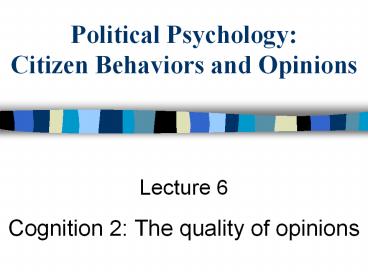Political Psychology: Citizen Behaviors and Opinions - PowerPoint PPT Presentation
Title:
Political Psychology: Citizen Behaviors and Opinions
Description:
Political Psychology: Citizen Behaviors and Opinions Lecture 6 Cognition 2: The quality of opinions Program Simulations and vote choice Simulations and public opinion ... – PowerPoint PPT presentation
Number of Views:177
Avg rating:3.0/5.0
Title: Political Psychology: Citizen Behaviors and Opinions
1
Political PsychologyCitizen Behaviors and
Opinions
- Lecture 6
- Cognition 2 The quality of opinions
2
Program
- Simulations and vote choice
- Simulations and public opinion
- Deliberative polling
3
Simulations and vote choice
- Lecture 6
- Cognition 2 The quality of opinions
4
Bartels (1996)
- Approach
- Simulate the behavior of an electorate that is
completely informed and compare it to the actual
behavior of voters. - Criteria
- Compare the behavior of each individual to the
behavior of informed individuals with the same
sociodemographic profile. - Subject
- 6 US presidential elections, 1972-1992
5
Bartels (1996)
6
Bartels (1996)
- Less informed citizens do not vote the same way
they would have voted if they had been informed
in the US. - The incumbent party receives five points more
than they would have obtained under full
information. - The Democrats receive two points more than they
would have obtained under full information.
7
Oscarsson (2007)
- Same approach as Bartels
- Simulations with information / socio-demographic
interactions - Subject
- 6 Swedish elections, 1985-2002
8
Oscarsson (2007)
9
Blais et al. (2009)
- Simpler approach
- Does information have an impact on vote choice
controlling for socio-demographics and PID? - Subject
- 6 Canadian elections, 1988-2006
10
(No Transcript)
11
Blais et al. (2009)
12
Blais et al. (2009)
- One step further
- Why do information gaps appear in some elections
and not others? - Hypothesis
- Visibility is the key less informed vote more
for more visib. parties.
13
Blais et al. (2009)
14
Implications
- Citizens do not vote as they would have voted if
they had possessed more information. - All mechanisms that allegedly overcome
information shortages do not perform that role
perfectly.
15
Simulations and public opinion
- Lecture 6
- Cognition 2 The quality of opinions
16
Althaus (1998)
- Question
- Would preferences about public policy be
different if people were more informed? - Method
- Applying to each person the behavior of
informed individuals with the same
socio-demographic profile. - Subject
- 45 American public policies
17
Althaus (1998)
18
Althaus (1998)
- Often, the population is not able to express the
public policy preferences that it would possess
if it held more political information.
19
Deliberative polling
- Lecture 6
- Cognition 2 The quality of opinions
20
Deliberative poll
- Quasi-experimental technique that seeks to
determine the opinions of a representative sample
of citizens with more information, thought and
discussion about an issue.
21
Deliberative poll
- Draw of a representative sample.
- First interview by telephone.
- Readings, followed by a weekend of presentations
by experts and discussions among participants. - Second questionnaire on site.
22
England, election, 1997
- Labour Conserv. Lib.-Dem.
- Result of the
- election 44 32 17
- DP intentions
- pre-deliberation 52 29 13
- DP intentions
- post-deliberation 44 21 33
- DP reported
- votes 42 18 37
23
England, crime, 1994
24
USA, Iraq intervention, 2003
- Pre-delib. Post-delib.
- Favorable to military intervention if existence
of weapons of mass destruction is proven.
73 77 - Favorable to military intervention if proofs do
not persuade the security council. 46
37 - Favorable to military intervention if no new
proof is found. 31 22 - Support to unilateral American action.
58 44
25
Implications
- If an increase in information generates opinion
change, then the original opinions were not
enlightened. - Individuals opinions are not those that they
would have formed with more information.
26
Conclusion
- Lecture 6
- Cognition 2 The quality of opinions
27
Conclusion
- All studies find opinion gaps between information
groups. - People do not hold the opinions that they would
have developed if informed. - Information deficiencies are not overcome.































